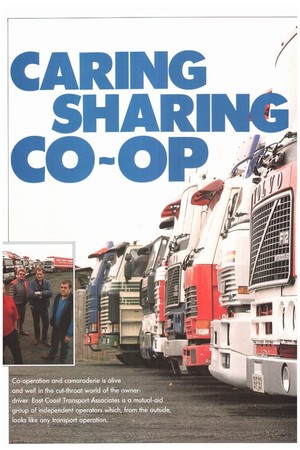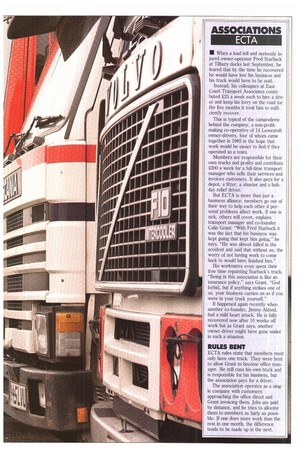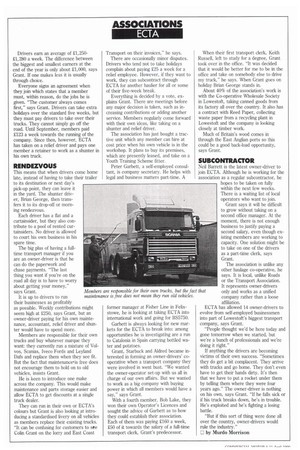Co-operation and camaraderie is alive and well in the cut-throat
Page 56

Page 57

Page 58

If you've noticed an error in this article please click here to report it so we can fix it.
world of the owner driver. East Coast Transport Associates is a mutual-aid group of independent operators which, from the outside, looks like any transport operation. •
ASSOCIATIONS ECTA
• When a load fell and seriously injured owner-operator Fred Starbuck at Tilbury docks last September, he feared that by the time he recovered he would have lost his business and his truck would have to be sold.
Instead, his colleagues at East Coast Transport Associates contributed £25 a week each to hire a driver and keep his lorry on the road for the five months it took him to sufficiently recover.
This is typical of the camaraderie behind the company, a non-profitmaking co-operative of 14 Lowestoft owner-drivers, four of whom came together in 1985 in the hope that work would be easier to find if they operated as a team, Members are responsible for their own trucks and profits and contribute £200 a week for a full-time transport manager who sells their services and invoices customers. It also pays for a depot, a fitter, a shunter and a holiday relief driver.
But ECTA is more than just a business alliance: members go out of their way to help each other if personal problems affect work. If one is sick, others will cover, explains transport manager and co-founder Colin Grant: "With Fred Starbuck it was the fact that his business was kept going that kept him going," he says. "He was almost killed in the accident and said that without us, the worry of not having work to come back to would have finished him."
His workmates even spent their free time repainting Starbuck's truck. "Being in this association is like an insurance policy," says Grant. "God forbid, but if anything strikes one of us, your business carries on as if you were in your truck yourself."
It happened again recently when another co-founder, Jimmy Aldred, had a mild heart attack. He is fully recovered now after 10 weeks off work but as Grant says, another owner-driver might have gone under in such a situation.
RULES BENT
ECTA rules state that members must only have one truck. They were bent to allow Grant to become office manager. He still runs his own truck and is responsible for his business, but the association pays for a driver.
The association operates as a single company with customers approaching the office direct and Grant invoicing them. Jobs are paid by distance, and he tries to allocate them to members as fairly as possible. If one does more work than the rest in one month, the difference tends to be made up in the next. Drivers earn an average of £1,250£1,280 a week. The difference between the biggest and smallest earners at the end of the year is only about £1,000, says Grant. If one makes less it is usually through choice.
Everyone signs an agreement when they join which states that a member must, within reason, do the jobs he is given. "The customer always comes first," says Grant. Drivers can take extra holidays over the standard five weeks, but they must pay drivers to take over their trucks. They cannot simply go off the road. Until September, members paid 2123 a week towards the running of the company. Since then, however, ECTA has taken on a relief driver and pays one member a retainer to work as a shunter in his own truck.
RENDEZVOUS
This means that when drivers come home late, instead of having to take their trailer to its destination or next day's pick-up point, they can leave it in the yard. The shunter driver, Brian George, then transfers it to its drop-off or morning rendezvous.
Each driver has a flat and a curtainsider, but they also contribute to a pool of rented curtainsiders. No driver is allowed to court his own business in his spare time.
The big plus of having a fulltime transport manager if you are an owner-driver is that he can do the paperwork and chase payments. "The last thing you want if you're on the road all day is to have to worry about getting your money," says Grant.
It is up to drivers to run their businesses as profitably as possible. Weekly contributions might seem high at 2250, says Grant, but an owner-driver paying for his own maintenance, accountant, relief driver and shunter would have to spend more.
Members are responsible for their own trucks and buy whatever marque they want: they currently run a mixture of Volvos, Scanias, Iveco Fords and Leyland Dafs and replace them when they see fit. But the fact that maintenanceis free does not encourage them to hold on to old vehicles, insists Grant.
He is keen to introduce one make across the company. This would make maintenance and parts storage easier and allow ECTA to get discounts at a single truck dealer.
They can run in their own or ECTA's colours but Grant is also looking at introducing a standardised livery on all vehicles as members replace their existing trucks. "It can be confusing for customers to se Colin Grant on the lorry and East Coast Transport on their invoices," he says.
There are occasionally minor disputes. Drivers who tend not to take holidays complain about paying £25 a week for a relief employee, However, if they want to work, they can subcontract through ECTA for another haulier for all or some of their five-week break.
Everything is decided by a vote, explains Grant. There are meetings before any major decision is taken, such as increasing contributions or adding another service. Members regularly come forward with their own ideas, like taking on a shunter and relief driver.
The association has just bought a tractive unit which any member can hire at cost price when his own vehicle is in the workshop. It plans to buy its premises, which are presently leased, and take on a Youth Training Scheme fitter.
Peter Garbett, a self-employed consultant, is company secretary. He helps with legal and business matters part-time. A
former manager at Fisher Line in Felixstowe, he is looking at taking ECTA into international work and going for BS5750.
Garbett is always looking for new markets for the ECTA to break into: among opportunities he is investigating are a run to Catalonia in Spain carrying bottled water and potatoes.
Grant, Starbuck and Aldred became interested in forming an owner-drivers' cooperative when a transport company they were involved in went bust. "We wanted the owner-operator set-up with us all in charge of our own affairs. But we wanted to work as a big company with buying power in which all members would have a say," says Grant.
With a fourth member, Bob Lake, they won their own Operator's Licences and sought the advice of Garbett as to how they could establish their association. Each of them was paying £160 a week, £50 of it towards the salary of a full-time transport clerk, Grant's predecessor. When their first transport clerk, Keith Russell, left to study for a degree, Grant took over in the office. "It was decided that it would be better for me to be in the office and take on somebody else to drive my truck," he says. When Grant goes on holiday Brian George stands in.
About 40% of the association's work is with the Co-operative Wholesale Society in Lowestoft, taking canned goods from its factory all over the country. It also has a contract with Reed Paper, collecting waste paper from a recycling plant in Lowestoft and the company is looking closely at timber work.
Much of Britain's wood comes in through the East Anglian ports so this could be a good back-load opportunity, says Grant.
SUBCONTRACTOR
Neil Barrett is the latest owner-driver to join ECTA. Although he is working for the association as a regular subcontractor, he hopes to be taken on fully within the next few weeks. There is a waiting list of local operators who want to join.
Grant says it will be difficult to grow without taking on a second office manager. At the moment, there is not enough business to justify paying a second salary, even though existing members are working to capacity. One solution might be to take on one of the drivers as a part-time clerk, says Grant.
The association is unlike any other haulage co-operative, he says. It is local, unlike Roads or the Transport Association. It represents owner-drivers only and works as a unified company rather than a loose affiliation.
ECTA has allowed 14 owner-drivers to evolve from self-employed businessmen into part of Lowestoft's biggest transport company, says Grant.
"People thought we'd be here today and gone tomorrow when we started, but we're a bunch of professionals and we're doing it right."
If anything the drivers are becoming victims of their own success. "Sometimes they do get a bit complacent. They arrive with trucks and go home. They don't even have to get their hands dirty. It's then that we have to put a rocket under them by telling them where they were four years ago." The owner-driver is nothing on his own, says Grant. "If he falls sick or if his truck breaks down, he's in trouble. He's exploited and he's fighting a losing battle.
"But if this sort of thing were done all over the country, owner-drivers would rule the industry."
by Murdo Morrison
















































































































































